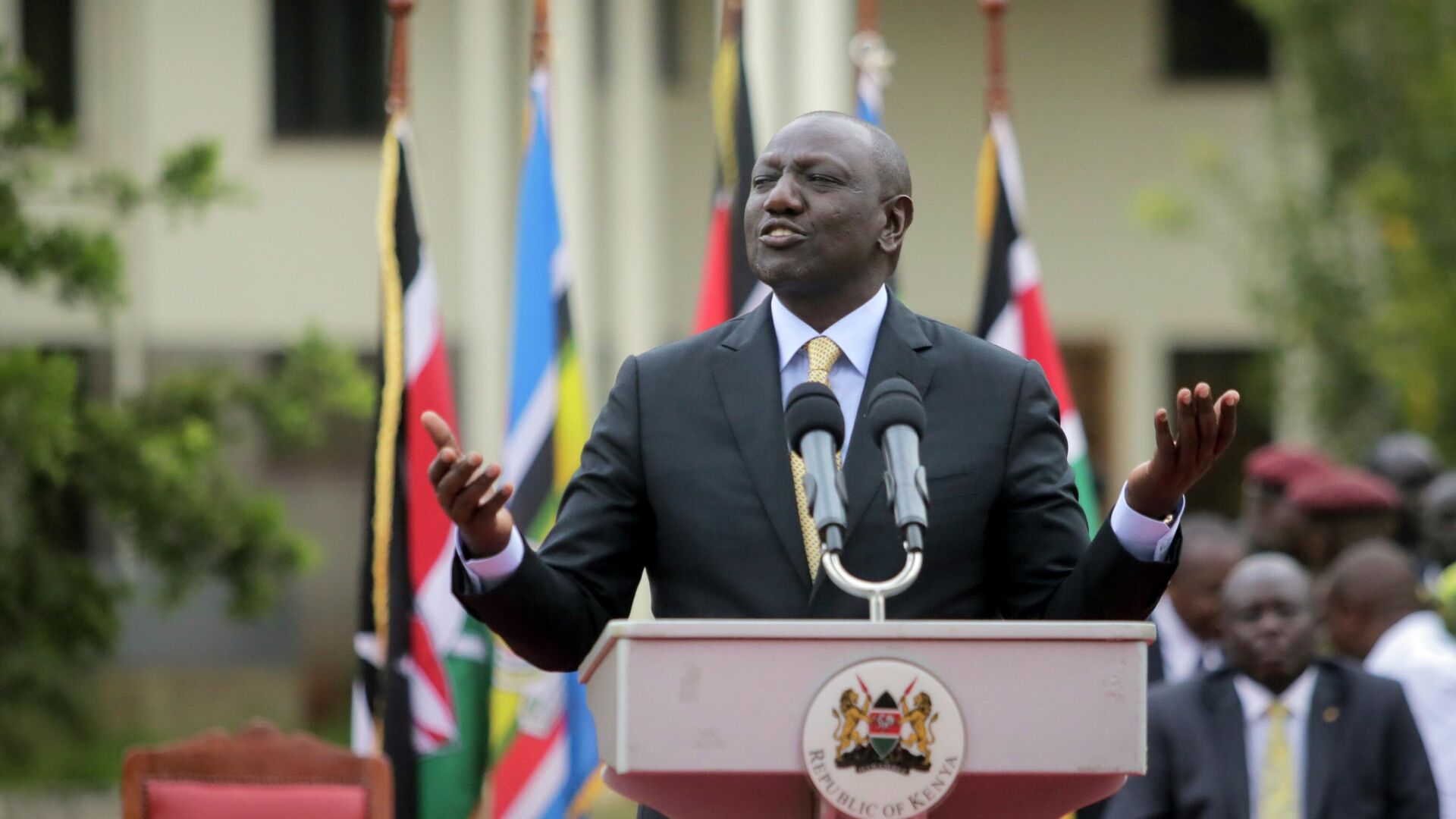https://sputnikglobe.com/20220909/could-rutos-realpolitik-approach-boost-kenyas-growth-offer-new-opportunities-to-russia-in-africa-1100611287.html
Could Ruto's Realpolitik Approach Boost Kenya's Growth, Offer New Opportunities to Russia in Africa?
Could Ruto's Realpolitik Approach Boost Kenya's Growth, Offer New Opportunities to Russia in Africa?
Sputnik International
Earlier this week, Kenya's Supreme Court upheld the election victory of William Ruto, the country's deputy president, who came out on top in the country's... 09.09.2022, Sputnik International
2022-09-09T17:05+0000
2022-09-09T17:05+0000
2022-11-23T11:36+0000
africa
opinion
kenya
russia
economy
inflation
nuclear power
grain
food
energy efficiency
https://cdn1.img.sputnikglobe.com/img/07e6/09/09/1100602095_0:296:3071:2024_1920x0_80_0_0_1931696c68d77cdd2833e60610d7561d.jpg
William Ruto is set to inherit a divided and indebted country, hit by inflation and a sliding currency. While Kenya's financial budget amounts to 3.3 trillion Kenyan shillings (about $27.4 billion), the nation's external debt stands at around $36.4 billion, with the World Bank, Eurobond holders, and China being its biggest lenders."The previous government of Uhuru Kenyatta was passionate about building ostentatious mega projects," she continued. "They built a railway from Mombasa to Nairobi; then there was not enough money to continue it to Uganda. They also kicked off a multi-lane highway, some kind of irrigation project, and a huge highway inland to Ethiopia, to Sudan. In short, neither of these projects have been finished. A huge amount of money was spent on this. Now their public debt is about 80% of GDP, and Ruto is in dire need of money."Rising energy prices, below average rains, and the post-COVID recovery have contributed a lot to Kenya's swirling inflation, echoes Professor X.N. Iraki, an economist at the University of Nairobi, founder of the Member-Operations Management Society of Kenya, and Fulbright Scholar.In addition to that, the president-elect has to deal with a divided country, Iraki notes."Division is from the feeling that some regions or communities have dominated leadership and economic power, excluding the rest," the professor says. "Social economic classes are real. Unless the economy turns round, the divisions shall widen. Ruto in power will not change things overnight, but if he puts the right policies, right people in place, we could see the economy turning round in the long run. But the 'feel good effect' among the ordinary people could catalyze the economy, just like [former Kenyan President Mwai] Kibaki after the end of the Kenya African National Union (KANU) era."Ruto: 'Hustler-in-Chief' Against Kenyan 'Dynasties'Ruto's win came as a break from Kenya's longstanding political competition between the Kikuyu and the Luo, the two largest ethnic groups in the country, with the Kenyatta (Kikuyu) and the Odigna (Luo) political families playing the most prominent roles since the country gained independence in 1963. Three of the country's four presidents belonged to the Kikuyu ethnic group.Ruto is of Kalenjin ethnicity, the third largest in Kenya, akin to President Daniel Arap Moi, who governed the nation between 1978 and 2002.While ethnicity still remains an important factor in determining voting patterns in Kenya, Ruto placed his bet on "class" differences between privileged dynastic families and "hustlers" who struggle to put food on the table. He portrayed himself as a "hustler-in-chief" who used to sell chickens by the roadside before becoming one of Kenya's wealthiest men.According to The Star, a Kenyan daily, Ruto is seen by some as an advocate of a neo-Marxist approach: he moved away from "tribalism" and offered "a new identity" for the "betrayed and longsuffering" Kenyan masses. "We want everyone to feel the wealth of this country. Not just a few at the top," Ruto said on the campaign trail, while promoting his "bottom-up" economic plan.It appears that his approach worked, as he managed to get votes in traditional Kikuyu strongholds. For instance, the Financial Times pointed out that Kikuyu people in Kenyatta's home region of Mount Kenya voted overwhelmingly for Ruto.Africa-Focused StrategyRuto's foreign policy approach is no less ambitious than his economic plans. In his manifesto, Ruto indicated he was going to adopt an Africa-focused foreign policy, and for good reason, according to Dr. Njoki Wamai, an assistant professor in politics and international relations at the United States International University Africa.Ruto's pan-African shift is a "good thing," according to the professor, because Africa right now has the fastest growing population, with the continent's economies growing at the fastest rate, even compared with Asia."An African-focused policy, of course, will expand Kenya’s influence on the economy," she elaborates. "First of all, it's economic influence. Two years ago, Kenya's economy was the 10th-largest economy in Africa. It's not as large, of course, as big economies such as Nigeria, South Africa, Egypt and Algeria. But I believe by focusing its economic relations on Africa, Kenya can benefit especially through the economies of scale on checking what its best products to sell are."Meanwhile, Kenya's neighbor Somalia presents a challenge to Nairobi, as Mogadishu is struggling with internal division and terrorist activities. The two countries' land boundary extends 681 kilometers (423 miles). Last month, fighters from the al-Shabaab armed group launched a gun-and-bomb assault on the Hayat Hotel in Mogadishu, which claimed the lives of over 20 people and left many more injured."Kenya has already been doing a lot of work in fighting violent extremism in Somalia," says Wamai. "And in 2013, Kenya went into Somalia through what we call Operation Linda Nchi [Protect the Country], again, to fight violent extremism and radicalization, and especially to prevent that from becoming a big issue in Kenya, because we share the border with Somalia."Ruto's Pragmatism & Kenya's Foreign TiesKenya is historically tied to the UK and the US, with the latter being its defense partner, notes Matveeva, adding that Nairobi is interested in maintaining working relations with the West. On the other hand, China has been calling the shots in the Eastern African state by kicking off bold projects and incorporating it in its Belt and Road vision.Still, it appears that Ruto is emerging as an independent pragmatist who is neither influenced by the West, nor by China.Likewise, Ruto has repeatedly subjected China to criticism over the apparent capture of the Mombasa port and using Chinese laborers on Belt and Road projects in areas which Kenyans have competency. He promised to review loans and agreements with Chinese firms if they harm Kenya's national interests.On the other hand, the newly elected president has largely avoided criticizing Moscow's special military operation in Ukraine, unlike many of his government colleagues, and refused to pin the blame on Russia for the unfolding food crisis.What Could Russia Offer Nairobi?Given Ruto's realpolitik approach and apparent independence, one might wonder whether his election gives an opportunity to Russia to enhance ties with Nairobi.Russia should try to further build relations with the Kenyan authorities, Lyapin believes. There are only two countries in Sub-Saharan Africa where economic risks can be assessed as medium rather than high, namely Kenya and Nigeria, according to him. These countries are also important economic hubs through which it is easier to enter neighboring countries. In addition to that, Kenya and Nigeria are key African states in terms of growth prospects.Even though Kenya remains a crowded place in terms of foreign presence, Russia still has a lot to offer to Kenya in order to boost its economic development and at the same time not multiply its already bloated debt, according to the Russian expert.While Russia is already maintaining trade relations with Kenya and supplying food and raw materials to the Eastern African state, this cooperation could be expanded given the rapid pace of growth of the continent's population and economy, the expert emphasizes.Furthermore, Russia could help Kenya solve the country's energy deficit issue. In 2017, Nairobi reportedly held talks with Russia about the construction of a nuclear power plant in the country, a project which is still being considered by the Kenyan leadership. Rosatom is reportedly in talks with several other African nations to build atomic stations. In addition, since 2013, the company has been offering free education programs in nuclear science to African students. As of December 2020, 256 students from Sub-Saharan Africa, including Rwanda, Ghana, Zambia, Kenya, Nigeria, Tanzania, Uganda, Ethiopia, and South Africa, studied in Russia in nuclear-related majors. In July 2022, Russia started building Egypt's first nuclear power plant to help the North African nation accelerate its technological and economic development.Last but not least is Russia's security assistance and military instructors, Lyapin says. This could come in handy for Nairobi given that the situation in Somalia and old enmities between the two states still pose challenges to the region's stability, according to him. Kenya's growth depends on many factors, including the security of the region, uninterrupted food deliveries, and energy efficiency, and Russia could play a role in Kenya's diversification of ties, offering solutions and a helping hand.
https://sputnikglobe.com/20220908/kenya-will-work-to-ensure-security-in-east-african-region-william-ruto-says-1100540798.html
https://sputnikglobe.com/20220824/kenyas-ethnic-communities-reportedly-demand-198bln-from-uk-for-colonial-crimes-1099952984.html
https://sputnikglobe.com/20220826/why-us-re-entry-wont-solve-somalias-security-problem--how-russia-can-save-the-day-1100025298.html
https://sputnikglobe.com/20220816/russia-plays-key-role-in-africas-military--economic-stability---south-africas-defense-minister-1099661505.html
africa
kenya
russia
Sputnik International
feedback@sputniknews.com
+74956456601
MIA „Rossiya Segodnya“
2022
News
en_EN
Sputnik International
feedback@sputniknews.com
+74956456601
MIA „Rossiya Segodnya“
Sputnik International
feedback@sputniknews.com
+74956456601
MIA „Rossiya Segodnya“
opinion, kenya, russia, economy, inflation, nuclear power, grain, food, energy efficiency, military instructors, william ruto, africa in details, africa insight
opinion, kenya, russia, economy, inflation, nuclear power, grain, food, energy efficiency, military instructors, william ruto, africa in details, africa insight
Could Ruto's Realpolitik Approach Boost Kenya's Growth, Offer New Opportunities to Russia in Africa?
17:05 GMT 09.09.2022 (Updated: 11:36 GMT 23.11.2022) Exclusive
Earlier this week, Kenya's Supreme Court upheld the election victory of William Ruto, the country's deputy president, who came out on top in the country's presidential election on August 15, gaining 50.5% of the vote. What's so special about Ruto and how would he solve Kenya's urgent socio-economic dilemmas?
William Ruto is set to inherit a divided and indebted country, hit by inflation and a sliding currency. While Kenya's financial budget amounts to 3.3 trillion Kenyan shillings (about $27.4 billion), the nation's external debt stands at around $36.4 billion, with the World Bank, Eurobond holders, and China being its biggest lenders.
"The main problem of Kenya today, in addition to the fact that there was a drought for four years, now there is a reduction in the supply of grain and fuel, and a huge public debt," says Kenya expert Natalya Matveeva, researcher at the Center for the Study of Transitional Economics, Institute for African Studies, Russian Academy of Sciences.
"The previous government of Uhuru Kenyatta was passionate about building ostentatious mega projects," she continued. "They built a railway from Mombasa to Nairobi; then there was not enough money to continue it to Uganda. They also kicked off a multi-lane highway, some kind of irrigation project, and a huge highway inland to Ethiopia, to Sudan. In short, neither of these projects have been finished. A huge amount of money was spent on this. Now their public debt is about 80% of GDP, and Ruto is in dire need of money."
Rising energy prices, below average rains, and the post-COVID recovery have contributed a lot to Kenya's swirling inflation, echoes Professor X.N. Iraki, an economist at the University of Nairobi, founder of the Member-Operations Management Society of Kenya, and Fulbright Scholar.
"[Ruto] also inherited national debt which must be paid," the academic continues. "Without raising taxes or reducing government expenditure, he may have to borrow more. Joblessness and competition for limited resources is another challenge he must confront. Add the great expectations from the voters."
In addition to that, the president-elect has to deal with a divided country, Iraki notes.
"Division is from the feeling that some regions or communities have dominated leadership and economic power, excluding the rest," the professor says. "Social economic classes are real. Unless the economy turns round, the divisions shall widen. Ruto in power will not change things overnight, but if he puts the right policies, right people in place, we could see the economy turning round in the long run. But the 'feel good effect' among the ordinary people could catalyze the economy, just like [former Kenyan President Mwai] Kibaki after the end of the Kenya African National Union (KANU) era."
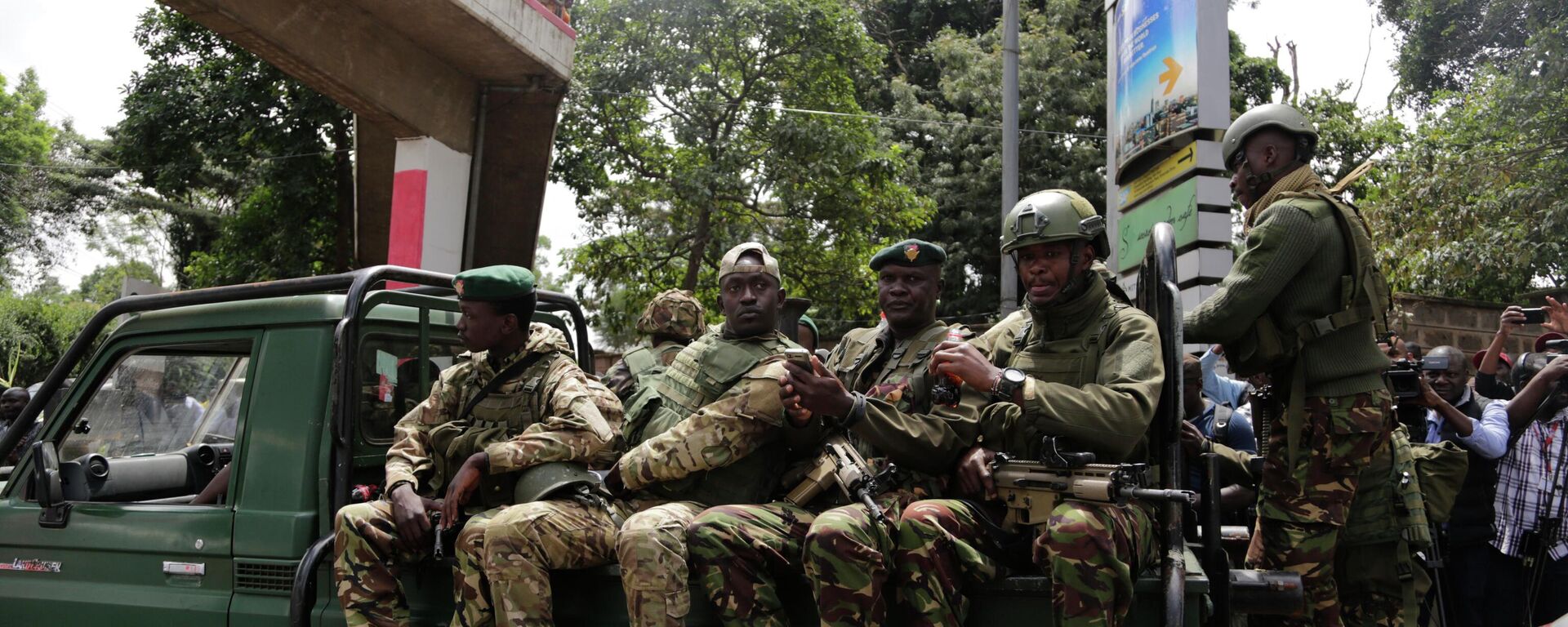
8 September 2022, 12:43 GMT
Ruto: 'Hustler-in-Chief' Against Kenyan 'Dynasties'
Ruto's win came as a break from Kenya's longstanding political competition between the Kikuyu and the Luo, the two largest ethnic groups in the country, with the Kenyatta (Kikuyu) and the Odigna (Luo) political families playing the most prominent roles since the country gained independence in 1963. Three of the country's four presidents belonged to the Kikuyu ethnic group.
Ruto is of Kalenjin ethnicity, the third largest in Kenya, akin to President Daniel Arap Moi, who governed the nation between 1978 and 2002.
While ethnicity still remains an important factor in determining voting patterns in Kenya, Ruto placed his bet on "class" differences between privileged dynastic families and "hustlers" who struggle to put food on the table. He portrayed himself as a "hustler-in-chief" who used to sell chickens by the roadside before becoming one of Kenya's wealthiest men.
According to The Star, a Kenyan daily, Ruto is seen by some as an advocate of a neo-Marxist approach: he moved away from "tribalism" and offered "a new identity" for the "betrayed and longsuffering" Kenyan masses. "We want everyone to feel the wealth of this country. Not just a few at the top," Ruto said on the campaign trail, while promoting his "bottom-up" economic plan.
It appears that his approach worked, as he managed to get votes in traditional Kikuyu strongholds. For instance, the Financial Times
pointed out that Kikuyu people in Kenyatta's home region of Mount Kenya voted overwhelmingly for Ruto.
"If he can get money, [his] 'bottom up' [economic plan] is achievable," Iraki says. "There is enough good will. But it will take time. Turning around an economy is harder than voting. The trickle-down economics has not worked, let’s try bottom up. He must start by changing our thinking, to see possibilities, to believe in work and innovation. One obstacle he will face is the high inequality in Kenya. Like trickling down, bottom up takes time, we hope the voters will be patient."
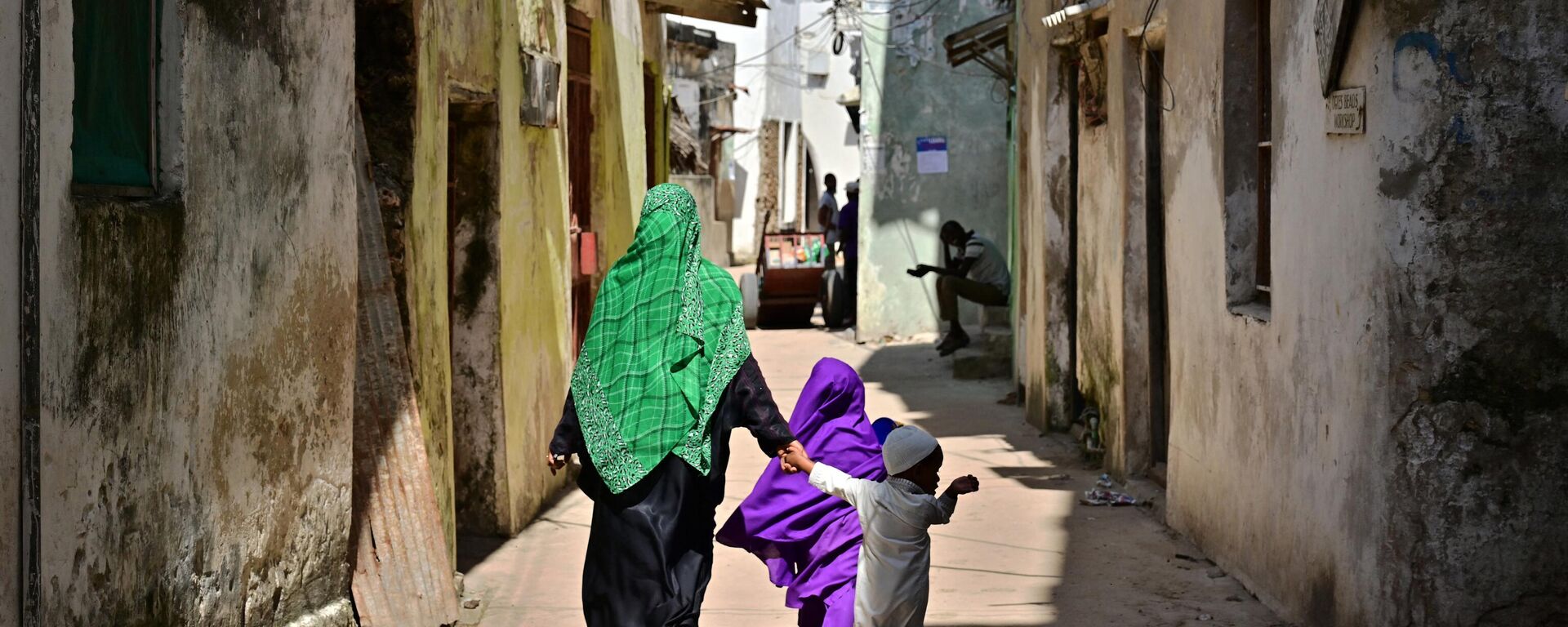
24 August 2022, 16:39 GMT
Ruto's foreign policy approach is no less ambitious than his economic plans. In his manifesto, Ruto indicated he was going to adopt an Africa-focused foreign policy, and for good reason, according to Dr. Njoki Wamai, an assistant professor in politics and international relations at the United States International University Africa.
"Kenya is going to focus more on strengthening relationships with other African countries," says Wamai. "And remember, this is coming from a context where for the longest time, especially during the first two regimes, that's the Jomo Kenyatta and President [Daniel Arap] Moi regimes, Kenya's main bilateral partners were its colonial masters, Britain and other Western countries. That started changing, of course, with Kibaki, because the third president brought in China, there was an increase of working with the BRICS countries. Starting from the second Kenyatta [Uhuru, son of Jomo Kenyatta and the country’s fourth president], there's been very deliberate efforts to be more pan-African in Kenya's foreign policy."
Ruto's pan-African shift is a "good thing," according to the professor, because Africa right now has the fastest growing population, with the continent's economies growing at the fastest rate, even compared with Asia.
"An African-focused policy, of course, will expand Kenya’s influence on the economy," she elaborates. "First of all, it's economic influence. Two years ago, Kenya's economy was the 10th-largest economy in Africa. It's not as large, of course, as big economies such as Nigeria, South Africa, Egypt and Algeria. But I believe by focusing its economic relations on Africa, Kenya can benefit especially through the economies of scale on checking what its best products to sell are."
Meanwhile, Kenya's neighbor Somalia presents a challenge to Nairobi, as Mogadishu is struggling with internal division and terrorist activities. The two countries' land boundary extends 681 kilometers (423 miles). Last month, fighters from the al-Shabaab armed group launched a gun-and-bomb assault on the Hayat Hotel in Mogadishu, which claimed the lives of over 20 people and left many more injured.
"Kenya has already been doing a lot of work in fighting violent extremism in Somalia," says Wamai. "And in 2013, Kenya went into Somalia through what we call Operation Linda Nchi [Protect the Country], again, to fight violent extremism and radicalization, and especially to prevent that from becoming a big issue in Kenya, because we share the border with Somalia."
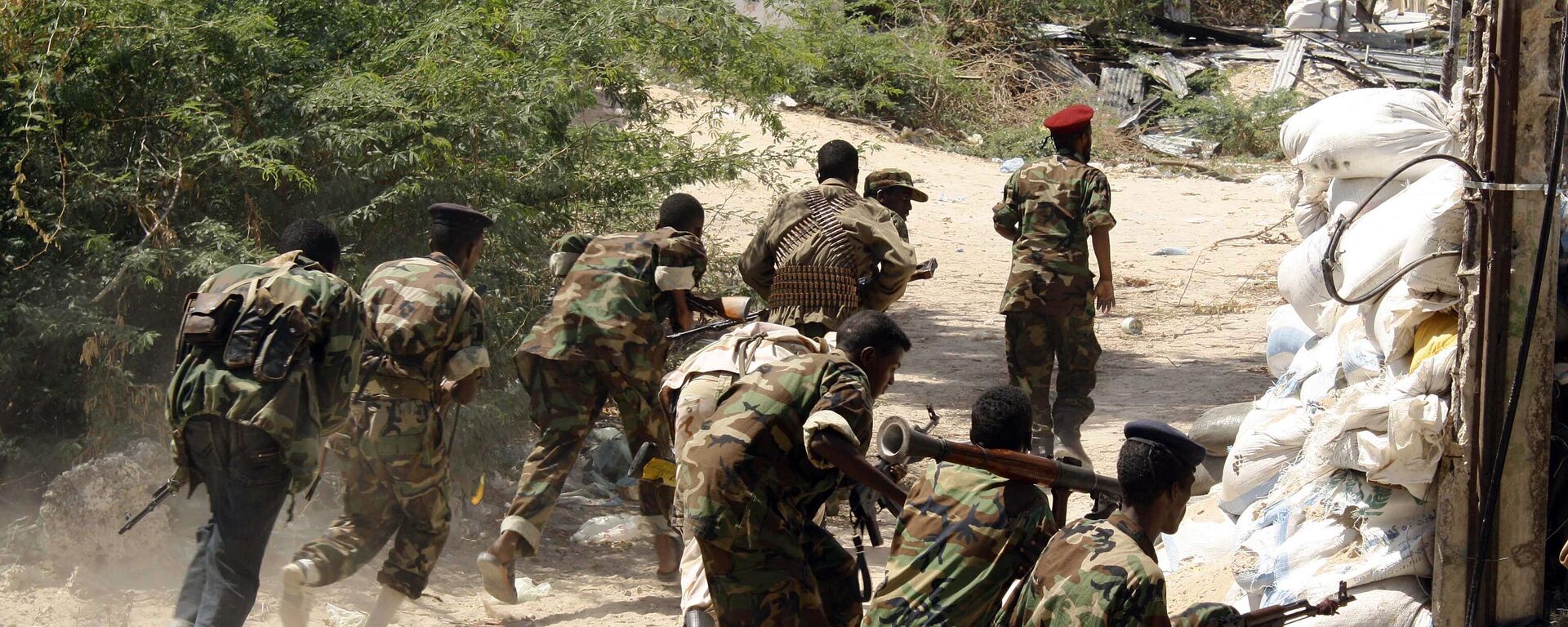
26 August 2022, 13:12 GMT
Ruto's Pragmatism & Kenya's Foreign Ties
Kenya is historically tied to the UK and the US, with the latter being its defense partner, notes Matveeva, adding that Nairobi is interested in maintaining working relations with the West. On the other hand, China has been calling the shots in the Eastern African state by kicking off bold projects and incorporating it in its Belt and Road vision.
Still, it appears that Ruto is emerging as an independent pragmatist who is neither influenced by the West, nor by China.
"He's coming in without a lot of support from Western states because he's seen as someone not liberal, who doesn't support liberal ideas and that kind of thing," Wamai notes.
Likewise, Ruto has repeatedly subjected China to criticism over the apparent capture of the Mombasa port and using Chinese laborers on Belt and Road projects in areas which Kenyans have competency. He promised to review loans and agreements with Chinese firms if they harm Kenya's national interests.
On the other hand, the newly elected president has largely avoided criticizing Moscow's special military operation in Ukraine, unlike many of his government colleagues, and refused to pin the blame on Russia for the unfolding food crisis.
"Ruto is known to be a pragmatic person with extensive entrepreneurial experience," says Mikhail Lyapin, representative of AFROCOM (Russian Chamber of Commerce and Industry) in Kenya. "Africa as a whole does not care about [Russia's] special military operation and just needs to get as many benefits as possible, i.e. loans, assistance in completion of planned nuclear power plants, food (including grain) and fertilizers."
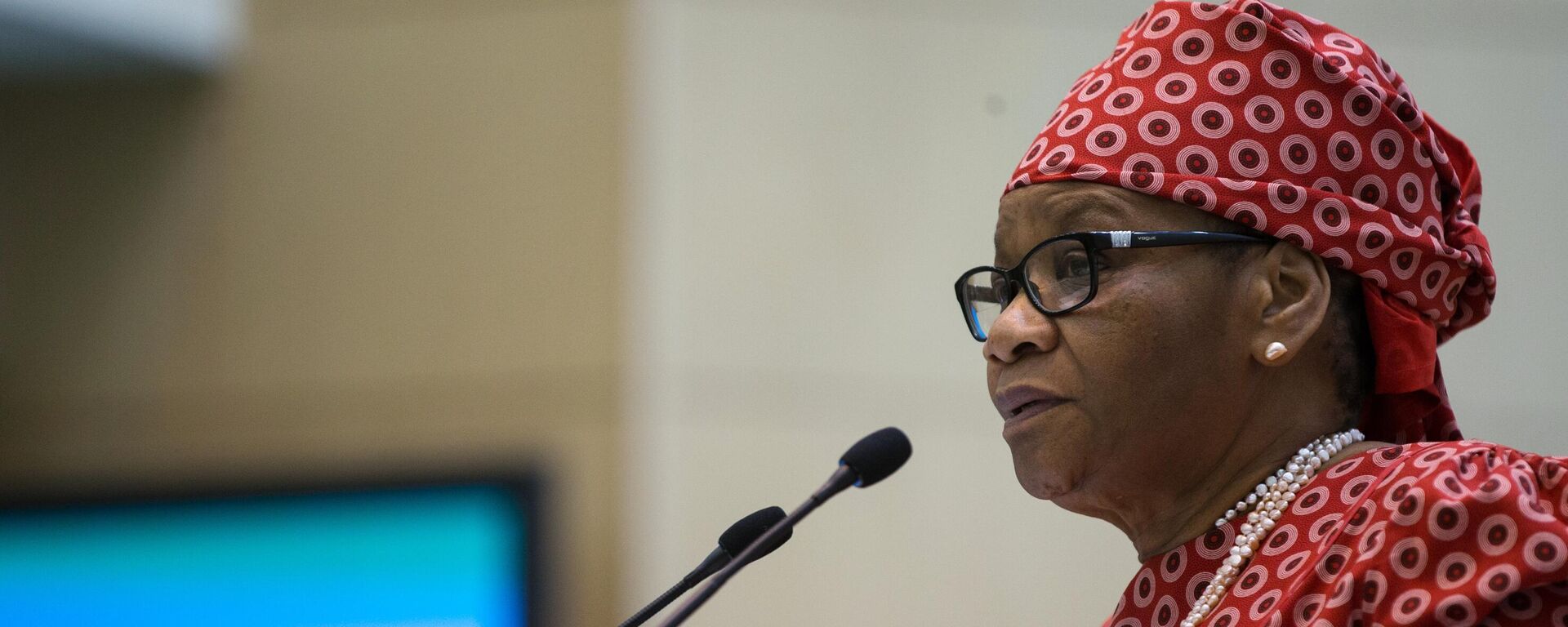
16 August 2022, 15:02 GMT
What Could Russia Offer Nairobi?
Given Ruto's realpolitik approach and apparent independence, one might wonder whether his election gives an opportunity to Russia to enhance ties with Nairobi.
Russia should try to further build relations with the Kenyan authorities, Lyapin believes. There are only two countries in Sub-Saharan Africa where economic risks can be assessed as medium rather than high, namely Kenya and Nigeria, according to him. These countries are also important economic hubs through which it is easier to enter neighboring countries. In addition to that, Kenya and Nigeria are key African states in terms of growth prospects.
Even though Kenya remains a crowded place in terms of foreign presence, Russia still has a lot to offer to Kenya in order to boost its economic development and at the same time not multiply its already bloated debt, according to the Russian expert.
"[Russia can offer] managers who, working here [in Kenya], could train local specialists," Lyapin says. "I know excellent technical directors and commercial directors from the Commonwealth of Independent States (CIS) who moved to Africa to work for hire and gained experience in managing local staff. They reformatted the skills of the staff for the needs of their businesses and today we are ready to conquer markets together with African employees, working with them on an equal footing."
While Russia is already
maintaining trade relations with Kenya and supplying food and raw materials to the Eastern African state, this cooperation could be expanded given the rapid pace of growth of the continent's population and economy, the expert emphasizes.
Furthermore, Russia could help Kenya solve the country's energy deficit issue. In 2017, Nairobi reportedly held talks with Russia about the construction of a nuclear power plant in the country, a project which is still being considered by the Kenyan leadership. Rosatom is reportedly in talks with several other African nations to build atomic stations. In addition, since 2013, the company has been offering
free education programs in nuclear science to African students. As of December 2020, 256
students from Sub-Saharan Africa, including Rwanda, Ghana, Zambia, Kenya, Nigeria, Tanzania, Uganda, Ethiopia, and South Africa, studied in Russia in nuclear-related majors. In July 2022, Russia
started building Egypt's first nuclear power plant to help the North African nation accelerate its technological and economic development.
Last but not least is Russia's security assistance and military instructors, Lyapin says. This could come in handy for Nairobi given that the situation in Somalia and old enmities between the two states still pose challenges to the region's stability, according to him. Kenya's growth depends on many factors, including the security of the region, uninterrupted food deliveries, and energy efficiency, and Russia could play a role in Kenya's diversification of ties, offering solutions and a helping hand.
